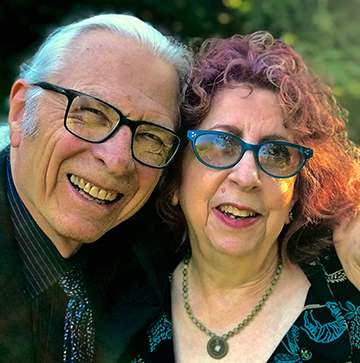THE UNFETTERED CRITIC
By Paula Block Erdmann & Terry Erdmann
Sometimes life, and theatre, is more than Fair
If we had to choose a favorite from all of Broadway’s tuneful offerings, My Fair Lady would likely lead the pack. So how “loverly” for us that the Oregon Shakespeare Festival currently is presenting an exceptional interpretation of Alan Jay Lerner and Frederick Loewe’s 1956 classic!
 You know the story. Eliza Doolittle, good-hearted, “squashed cabbage leaf” of a flower girl, encounters Henry Higgins, distinguished, overbearing snob of a linguistics professor. Higgins observes that Eliza’s Cockney accent keeps her eternally bound to the lower rungs of society. “Look at her, a pris’ner of the gutters,” he states, “condemned by every syllable she utters.” When Higgins boasts to his friend Colonel Pickering that by teaching the girl proper English he could get her a job as a shop assistant, clever Eliza takes note. The next morning she shows up at Higgins’ doorstep offering to pay for speech lessons. Recalling the professor’s claim that he could “pass her off as a duchess at an Embassy ball,” Pickering proposes a wager, and Higgins bites. As Eliza endures weeks of insults (tempered by chocolates), she realizes that she isn’t the ignorant guttersnipe Higgins thinks she is—and therein lies the fun…
You know the story. Eliza Doolittle, good-hearted, “squashed cabbage leaf” of a flower girl, encounters Henry Higgins, distinguished, overbearing snob of a linguistics professor. Higgins observes that Eliza’s Cockney accent keeps her eternally bound to the lower rungs of society. “Look at her, a pris’ner of the gutters,” he states, “condemned by every syllable she utters.” When Higgins boasts to his friend Colonel Pickering that by teaching the girl proper English he could get her a job as a shop assistant, clever Eliza takes note. The next morning she shows up at Higgins’ doorstep offering to pay for speech lessons. Recalling the professor’s claim that he could “pass her off as a duchess at an Embassy ball,” Pickering proposes a wager, and Higgins bites. As Eliza endures weeks of insults (tempered by chocolates), she realizes that she isn’t the ignorant guttersnipe Higgins thinks she is—and therein lies the fun…
And the songs, almost all timeless standards. Excelling as Eliza, lively actress Rachael Warren makes us want to join in as she sings “The Rain In Spain” and “I Could Have Danced All Night.” We actually feel for Higgins as actor Jonathan Haugen quietly laments, “I’ve Grown Accustomed To Her Face.” The leads are so good that we willingly relinquish memories of incandescent performers like Rex Harrison and Julie Andrews (or Audrey Hepburn) in the roles. Warren lifts Eliza into a place all her own, while Haugen smartly sings his way through the tunes rather than “talk” the songs as Harrison once did.
We’ve long thought that My Fair Lady contains two unnecessary characters. Freddie, the misguided chap who pines for Eliza, isn’t an integral part of the main story. He exists to demonstrate Eliza’s acceptance into a more elevated level of society. On the other end of the scale, Alfred, Eliza’s ne’er-do-well father, shows the depths she’s emerged from. They have nice songs, though, and director Amanda Dehnert found wonderfully innovative ways to use them. As Freddie, actor Ken Robinson nearly steals the show with his hilarious performance of the once-staid ballad, “The Street Where You Live,” which infers that his romantic attachment may literally be for the street—cobblestones, gravel, and all. And we applaud OSF staple Anthony Heald, as Alfred, who demonstrates astounding energy during an extended dance routine in “Get Me To the Church On Time.” As Heald and an ensemble of dancers stomp about the stage, the number resembles a play-within-the-play, brimming with excitement.
Dehnert’s best decision may be in her staging. Most of the cast—and the musicians—remain on stage at all times, so that wardrobe, location, and scene changes happen via a fluid choreography that is fully visible…yet largely unnoticeable. “Life isn’t neat, and theatre isn’t clean,” Dehnert asserts. “You should see where the lights hang, see the clothes being put on and taken off, see how people transform.”
My Fair Lady was based on George Bernard Shaw’s play Pygmalion, first produced in l916. Shaw, in turn, based his story on a verse from the Greek poet Ovid’s Metamorphoses: “Pygmalion, critical of faults which nature planted in female hearts, lived unmarried. With skill, he carved a statue out of ivory, and gave it exquisite beauty. She was so beautiful, he fell in love with his creation.”
Two thousand years later, in Ashland, so will you.
Paula and Terry each have long impressive-sounding resumes implying that they are battle-scarred veterans of life within the Hollywood studios. They’re now happily relaxed into Jacksonville.
 Paula and Terry identify as writers, with an ever-increasing number of published works to support the supposition. They live a primarily pastoral life in the enchanted town of Jacksonville.
Paula and Terry identify as writers, with an ever-increasing number of published works to support the supposition. They live a primarily pastoral life in the enchanted town of Jacksonville.